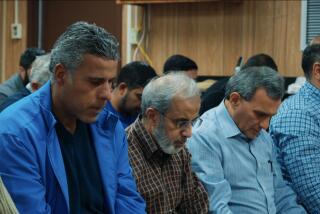Arguing with the Islamic ‘truth’
- Share via
My father was an Indian Muslim who didn’t care much for Islam; his childhood hadn’t been much improved by strict Muslim schooling and teachers with sticks. Toward the end of his life he preferred Buddhism to Islam, as there was less aggression and punishment in it. (“And altogether less religion,” as he put it.) I was brought up in England to be suspicious of religious power.
But in the early 1990s, after my first visit to Pakistan (where I’d had a taste of what it was like to live in a more or less theocratic state), after the fatwa against Salman Rushdie, and after the death of my father, I began to visit various London mosques. I went to research what became “The Black Album,” a novel about a group of young radical Muslims in West London who burn “The Satanic Verses” and attack a bookshop. Perhaps I also went to find something of my father there.
The mosques I visited, in Whitechapel and Shepherd’s Bush, were nothing like any church I’d attended. The scenes, to me, were extraordinary, and I was eager to capture them in my novel. There would be passionate orators haranguing a group of people sitting on the floor. One demagogue would replace another periodically, but the preaching went on continuously, as listeners of all races came and went. There would be diatribes against the West, Jews and -- their favorite subject -- homosexuals. In my naivete I sometimes wondered whether, at the end of his speech, the speaker might take questions or engage with his audience. But he never did. Most of the audience for this sort of thing was, I noticed, under 30 years old.
Sometimes I would be invited to the homes of the young fundamentalists I met. One had a similar background to my own: His mother was English, his father a Muslim, and he’d been brought up in a quiet suburb. Now he was married to a woman from Yemen who spoke no English. Bringing us tea, she came into the room backward, bent over, out of respect for the men. The men would talk to me of “going to train” in various places, but they seemed so weedy and polite, I couldn’t believe they’d want to kill anyone.
What did disturb me was this. These men believed they had access to the Truth, as stated in the Koran. There could be no doubt -- or even much dispute -- about moral, social and political problems because God had the answers. To argue with the Truth was, for them, like disagreeing with the facts of geometry. For them the source of all virtue and vice was the pleasure and displeasure of Allah. To be a responsible human being was to submit to this. As the Muslim writer Shabbir Akhtar put it in his book “A Faith for All Seasons,” “Allah is the subject of faith and loving obedience, not of rational inquiry or purely discursive thought. Unaided human reason is inferior in status to the gift of faith.”
I found these sessions so intellectually stultifying and claustrophobic that at the end I’d rush into the nearest pub and drink rapidly, wanting to reassure myself I was still in England.
Ludwig Wittgenstein compared ideas to tools, which you can use for different ends. Some open the world up. But the idea that you can do everything with one tool is ridiculous. Without adequate intellectual tools and the ability to think freely, too many Muslims are incapable of establishing a critical culture that goes beyond a stifling Islamic paradigm.
If the idea of multiculturalism makes some people vertiginous, then mono-culturalism -- of whatever sort -- is much worse. Political and social systems have to define themselves in terms of what they exclude, and conservative Islam is leaving out a lot. In New York recently, a Turkish woman told me that Islam was denying its own erotic heritage, as shown in the Arabian Nights, the Perfumed Garden and the tales of Hamza.
It is not only sexuality being excluded here, but the whole carnival of culture that comes from human desire. Our stories, dreams, poems and drawings enable us to experience ourselves as strange to ourselves.
You can’t ask people to give up their religion; that would be absurd. Religions may be illusions, and they may betray infantile wishes in their desire for certainty, but they are important and profound illusions. Nevertheless, they are modified as they come into contact with other ideas. This is what an effective multiculturalism is: not a superficial exchange of festivals and food, but a robust and committed exchange of ideas -- a conflict that is worth enduring, rather than a war.
When it comes to teaching the young, we have the human duty to inform them that there is more than one book in the world, and more than one voice, and that if they wish to have their voices heard by others, everyone else is entitled to the same thing. These children deserve better than an education that comes from liberal guilt.
More to Read
Sign up for Essential California
The most important California stories and recommendations in your inbox every morning.
You may occasionally receive promotional content from the Los Angeles Times.













